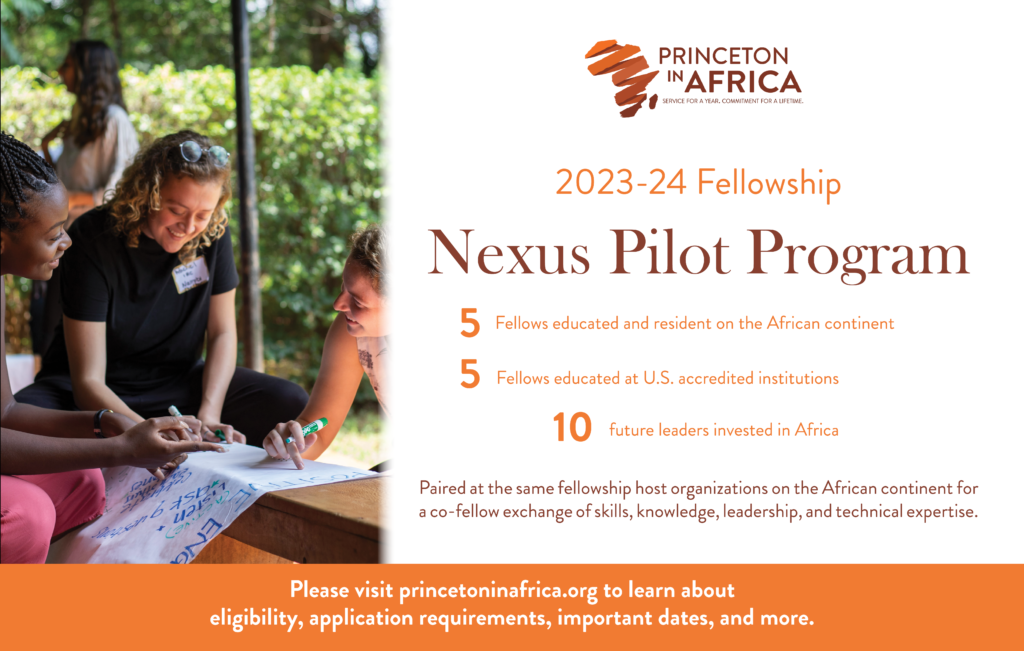My fellowship has been the most impactful personal and professional development opportunity of my life. I wanted a post-college experience that would push my limits, expand my comfort zone, and help me discern the next steps in my career journey. And this has been the case.

Nexus

Princeton in Africa Nexus is a program pilot for the 2023-24 fellowship year
In 2023, Princeton in Africa is expanding our model to pilot Nexus! Princeton in Africa Nexus will pair 5 Africa Fellows educated and resident on the African continent with 5 Fellows educated at U.S. accredited institutions in the same fellowship host organizations on the African continent for a co-fellow exchange of skills, knowledge, leadership, and technical expertise. The Nexus is an addition to PiAf’s signature fellowship program tailored for young leaders educated at a U.S.-accredited institution!
The program is designed to enrich our Fellows’ experience and professional growth on the African continent and bring young professionals educated in African institutions into our community of nearly 700 alumni spanning all over the world.
How do I become a Nexus Fellow?
In order to be eligible for the Nexus program, applicants must:
- Have citizenship in an African Country and have current residency in an African country (applicants with dual U.S. citizenship will not be considered).
- Have an Undergraduate Degree or a Master’s degree (or equivalent), or a Ph.D. from an African University.
Please see additional FAQs on our website to learn more.
How does the Nexus program differ from the general fellowship program?
The eligibility requirements of the general PiAf fellowship program are:
- PiAf general applicants must be recent graduates or graduating seniors of a U.S.-accredited 4-year college or university. Note, most universities outside of the U.S. are not U.S.-accredited; if you graduate from a non-U.S. accredited university, then obtain an additional degree from a U.S.-accredited university, you would be eligible to apply for Princeton in Africa. All applicants must have a 4-year undergraduate degree or a graduate degree from a U.S.-accredited university.
- If a candidate interested in Nexus only has a degree from an accredited 4-year U.S. college or university they would be considered for the general fellowship program.
Please see additional FAQs on our website to learn more.
Nexus Application Requirements
- Resume or CV (2 pages max)
- Official transcript (All Applicants)
- University Enrollment Verification Documentation (Nexus Applicants Only)
- One letter of recommendation (submitted using this form)
- Complete Online Application
- Demonstrated commitment to service
2023-24 Orientation
Nexus Fellows are required to attend the 2023-24 orientation virtually and in real-time. The orientation will take place in Eastern Standard Time at Princeton University, and will be streamed live so Nexus Fellows will be able to interact with others and participate in sessions.
When applying, applicants must attest that if selected as a Nexus Fellow, they will be able to virtually attend Princeton in Africa’s full mandatory orientation in real-time. Orientation starts on Wednesday, June 7th and concludes on Saturday, June 10th, 2023.
Our History
In 1999, a group of Princeton alumni, faculty, and staff launched Princeton in Africa as an independent affiliate of Princeton University inspired by the University’s informal motto, “Princeton in the Nation’s Service and in the Service of All Nations.” In 2010, the program opened up to include graduates of any US accredited university in order to meet the growing demand from host organizations and allow more young professionals access to the unique opportunities afforded by PiAf. During the past 20 years, we have placed over 600 Fellows with more than 100 organizations in 36 countries, while developing more strategic partnerships across Africa and creating more opportunities for our alumni community to engage with the continent and with one another.
